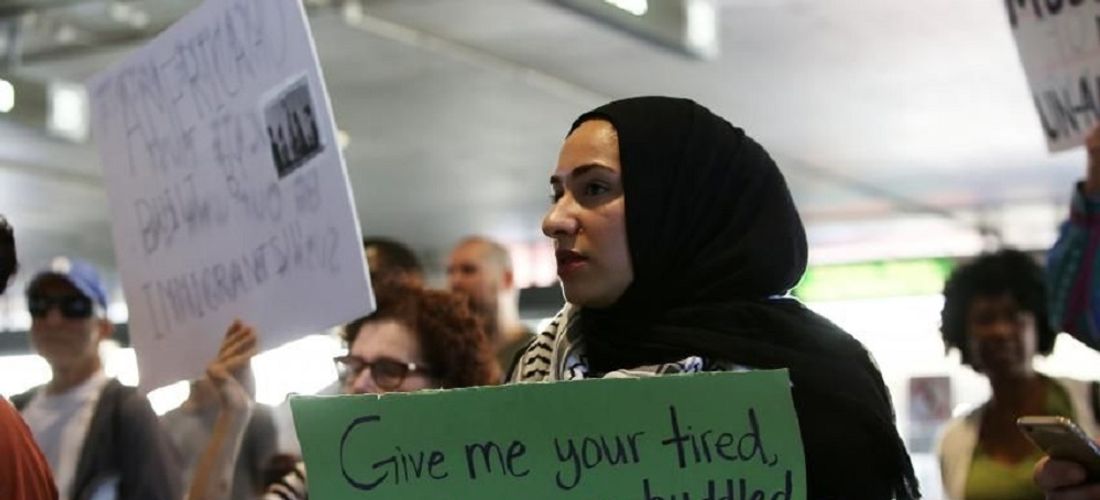Why the 2020 Presidential Election Can't Shock Us – What We have Learned in Four Years
Current Events
|
Aug 19, 2020
|
6 MIN READ

Muslim lawyers and others gather to protest President Donald Trump's Muslim ban; image source: Pinterest
Although I was born and raised in the Bible belt of America, I never felt the impact of being Muslim in America until recent years. This may be because I grew up in a very tight knit and conservative community, a bubble, so to speak. I went to an Islamic school my entire life. My childhood friends and I all attended the same school. We spent our time outside of school together, mainly in the masjid attending community events and weekend Quran classes.
I didn’t really have much contact with the non-Muslim environment around me other than the trips to the grocery store or mall with my mom. In high school I started a college credit program where my friends and I enrolled in a community college and took some courses there together as well as started volunteering in our local hospital. We did these things together, and I was always around a familiar face, so I didn’t feel alone or different.
It wasn’t until I graduated high school and started my first year of university at a private southern institution that I experienced a taste of culture shock and my first racist incident by one of my professors. I struggled a lot that year, going from an all Muslim environment to a university where I was the only hijabi. It was hard for me to immerse myself in the culture; for the first time in my life I felt like an outsider. I felt different, I looked different.
Four years ago during the 2016 election season, I felt “otherized” in witnessing how Donald Trump stirred up so much anti-Muslim, anti-Latino, anti-immigrant, anti-Black and other anti-sentiments that had festered beneath the surface for many Americans. The past four years has shaken us awake to the numerous, grievous problems we face in our nation. But what it also has done, as we near this crucial 2020 presidential election, is created a collective strength to push back against all the hate, racism, classism and ugliness of the last several years.
After my early struggles in university, we moved to Canada a couple of years later, where I finished my undergraduate degree. I married and moved back to the South. I had to relearn how to immerse myself back into the southern American society as visibly Muslim woman. Alhamdulillah, I can say that other than the incident by my professor during my freshman year and my general uneasiness, I have not personally encountered racism nor have I received any racist comments. I know that is far from the case for so many others.

I started my graduate program in 2014, and in the spring semester of my second year (2015), the political climate started to take a turn in America, especially for those who are Muslim, people of color, and ethnic backgrounds. The night of the Chapel Hill shootings in early February of 2015 is one that I will never forget.
For the first time in my life, I felt afraid living in America, a place that I’ve called home for 24 years. The deaths of Deah, Yusor, and Razan touched so many of our lives so deeply across the country despite having never met them. Why? Because they were us. Young, American university students living their lives, normally and safely, or so they thought only to be cut short by a wake up call of hate and rage that we weren’t prepared for. Except the hate and rage were already building as Trump’s campaign was gathering foul steam in the lead up to capturing the Republican nomination and then becoming our President.
This was only the beginning. Soon after the news was filled with incidents of so many other acts of racial, religious and hateful violence. Suddenly Muslims, along with many other religious, racial and cultural minorities, were made to feel like we did not belong, that we were foreigners in our own country, that we had to constantly prove our “American-ness.” That we have to always put on a friendly face so as to not appear aggressive or a threat. For what felt like the first time in our lives, our livelihood was at stake. (This was a feeling that many of our fellow Blacks and Black Muslims pointed out was there for them all along.)
I remember this so clearly, and as the 2016 elections were closely approaching, the fear of Trump becoming president was the hot topic of discussion at every gathering. So many didn't, couldn’t believe that someone with his rhetoric, immoral behavior and crassness would ever make it to presidency.
I always knew he would.
Putting his lack of eloquence, self respect, common sense and intelligence to the side, he represented the typical white privileged American who was afraid and angry about losing their control and power in this country. Low and behold, they got what he and others like him wanted.
Trump won the 2016 elections only a few nights after I had given birth to my daughter. I will never forget that night. My husband and I were watching the news carefully, eyes glued to the television watching the election results come in. I remember the faces of the TV anchors, disbelief and shock as the numbers trickled in and the results were clear. I was nursing my daughter to sleep and remember holding her tight. She had no idea what was going on in the world; all that mattered was that she was safe and sound, cuddled against my chest.
I wanted to freeze that moment in time and make it last an eternity. I remember looking over to my husband and telling him, “I told you so.” His eyes were still laser focused on the screen and jaw slightly dropped. I think this was the reality of many people in America that night – uncertainty, fear and disbelief clouding our mind.
My focus was on my daughter and her future. What type of America will she grow up in? What obstacles will she face? I prayed a lot that night, asking Allah (S) for guidance in raising her through this troubling time, asking him for protection, strength and patience.

It’s 2020 now and so much has happened in the past four years. Aside from everything politically, we are currently facing a world wide pandemic of the novel coronavirus (COVID-19). Through the chaos and panic that has swept over us in the past several months, it feels similar at times to the fear I felt that night I watched Donald Trump get elected:
Lots of uncertainty; lots of questions with no answers.
The unknown is a scary head space to be in. Since 2016, between the increase of Islamophobia, the ongoing racism by radical, white nationalists and the never ending headlines exposing the harmful and untruthful rhetoric spread by the White House, one would think that Muslims would feel defeated in this upcoming election.
However, for me and so many others I know, that is farthest from the truth. In my home state alone, the first Muslim woman, Nida Allam, was elected to public office in North Carolina, joining Durham’s Board of Commissioners. In 2018, Muslims from my city of Charlotte saw one of their very own, Mujtaba Mohammed, elected to the North Carolina State Senate. This is only in addition to the countless efforts by numerous Muslim organizations and individuals working around the clock to mobilize the Muslim vote to make our voices heard.
Maybe Democratic presidential and vice presidential hopefuls Joe Biden and Kamala Harris will pull out a win this November. Maybe we’ll face four more years of (God forbid) Trump. But as I see it, one thing is for certain. Rather than feeling defeated by the storm of the 2016 elections, we, as Muslims around the country, have come out of these last four years stronger and better equipped for the upcoming election.
We know how much our lives and the health of this country is at stake. We know there are deep-seeded, ugly, decades-long societal problems we must continue working on. We cannot afford to coast, and we will not be afraid.
Subscribe to be the first to know about new product releases, styling ideas and more.
What products are you interested in?

